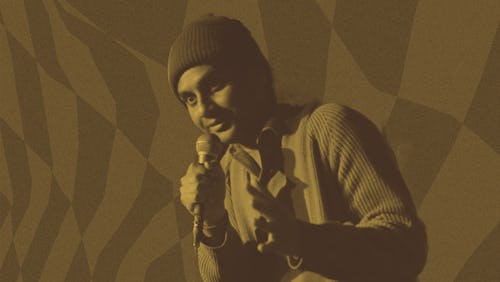Aziz Ansari is back again, but should anyone care?
In ‘Nightclub Comedian,’ he makes it clear he wants to move on.

Aziz Ansari’s surprise Netflix special, Nightclub Comedian, is a bizarre bit of standup for the once-beloved comedian. The 30-minute special takes place at the Comedy Cellar, New York’s famous small-stakes-but-big-deal comedy club. It’s the kind of place where huge stars got their start, novices are allowed to perform, and you never know who might pop in — which was the case for several audiences over the course of a few nights in December, when what they thought was just a night at a comedy club turned into an ambush by Ansari as the closer. The whole conceit makes Nightclub Comedian feel more like an act of defiance than a standup special, which might have been the intent. Even though Ansari has been touring widely for large audiences since the accusations made against him in 2018, this special makes clear he’s still reconciling with what happened to him and his career.
In this new special — his first since 2019, when he put out Aziz Ansari: Right Now, which was widely panned as a bitter rant against cancel culture — he opts instead for the conceit of innocence. Even the name itself suggests it, in that “nightclub comedians” are just regular comics out there hustling, not the super famous arena-packing ones like Aziz. Before he takes the stage, we see Ansari standing in the back of the club chuckling at the comic in front of him, waiting to go on holding his notebook. It’s a scene any comic whose played nightclubs knows well — and a far cry from the glamorous greenrooms and pampered intros of the pros. He reminds us of his humble beginnings and drops the anger at the door, bringing to the mic once he goes on instead a comic adamantly pretending that nothing ever happened.
He brings some of his Tom Haverford goofiness as well, adding in somewhat contrived, choked laughter in between his own jokes that scream “I’m just a regular guy!’ as he waits for the audience to join him. He keeps things mostly corny and clean. And he speaks from a moral high ground that seems to suggest someone who has done no wrong. He critiques our materialist, capitalist, technology crazed world that values buying NFTs over giving the homeless man on the street a spare dollar. He gets into the fact that if we all tried to understand the other side in our divisive political climate, we might comprehend why people come to the conclusions that they do — but not to linger too long or you’ll start shouting “Fauci’s a pedophile.”
The zingers are there, but so is a lot of insistence on heart. He suggests having compassion for anti-vaxxers, like Aaron Rodgers, with the joke there being that he’s just a dumb football player, so what did we expect? It’s a middling joke, but he keeps the bit going into somberness when he talks about his unvaccinated uncle dying of Covid recently, and considers how unproductive videos mocking the dead unvaccinated are. He keeps that kind of tone up, admonishing us for complaining about the pandemic creating a shortage of workers we never appreciated in the first place. It’s not that the jokes aren’t there, there’s just a lot of moral imperatives amongst them.
He does have moments that feel a bit referential to what happened to him in 2018. He rebukes everyone for living on their phones and “all being trapped in our little world,” and how we “live in comments threads now.” He goes on a rant about a fake scenario where Timothée Chalamet throws a bubble tea at an Asian man — one that feels like it’s meant to be read as a metaphor for the accusations of sexual misconduct Ansari himself has faced. But then there’s the innocent laugh and casual demeanor. The whole thing feels awkwardly underlined with the insistence that he’s still just silly Aziz! And he ends where he began. The special opens with clips of Ansari as an NYU student doing his first standup sets at the very same venue, and he ends by discussing them. He brandishes a rudimentary flip phone he’s proudly reverted back to, and jokingly texts what seems to be the message of the whole special, “I’m here.” As the special cuts there, the statement turns into a question: By “I’m here,” does he also mean, “I’m back”?